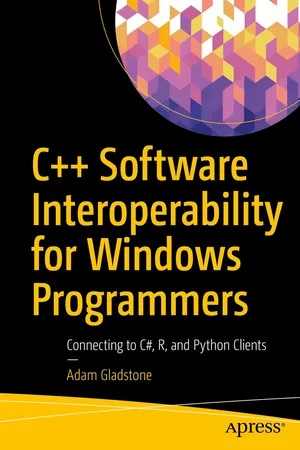
eBook - ePub
C++ Software Interoperability for Windows Programmers
Connecting to C#, R, and Python Clients
- English
- ePUB (mobile friendly)
- Available on iOS & Android
eBook - ePub
C++ Software Interoperability for Windows Programmers
Connecting to C#, R, and Python Clients
About this book
Get up-to-speed quickly and connect modern code written in C#, R, and Python to an existing codebase written in C++. This book for practitioners is about software interoperability in a Windows environment from C++ to languages such as C#, R, and Python. Using a series of example projects, the book demonstrates how to connect a simple C++ codebase packaged as a static or dynamic library to modern clients written in C#, R, and Python. The book shows you how to develop the in-between components that allow disparate languages to communicate.
What You Will Learn
- Build components that connect C++ to other languages
- Translate between the C++ type system and the type systems of C#, R, and Python
- Write a managed assembly targeting the .NET framework
- Create C++ packages for use in R/Studio
- Develop Python modules based on high-performance C++ code
- Overcome the difficulties and pitfalls involved in cross-language development
Who This Book Is For
Tools to learn more effectively

Saving Books

Keyword Search

Annotating Text

Listen to it instead
Information
Table of contents
- Cover
- Front Matter
- Part I. Foundations
- Part II. C++/CLI and .NET
- Part III. R and Rcpp
- Part IV. Python
- Back Matter
Frequently asked questions
Yes, you can cancel anytime from the Subscription tab in your account settings on the Perlego website. Your subscription will stay active until the end of your current billing period. Learn how to cancel your subscription
No, books cannot be downloaded as external files, such as PDFs, for use outside of Perlego. However, you can download books within the Perlego app for offline reading on mobile or tablet. Learn how to download books offline
Perlego offers two plans: Essential and Complete
- Essential is ideal for learners and professionals who enjoy exploring a wide range of subjects. Access the Essential Library with 800,000+ trusted titles and best-sellers across business, personal growth, and the humanities. Includes unlimited reading time and Standard Read Aloud voice.
- Complete: Perfect for advanced learners and researchers needing full, unrestricted access. Unlock 1.4M+ books across hundreds of subjects, including academic and specialized titles. The Complete Plan also includes advanced features like Premium Read Aloud and Research Assistant.
We are an online textbook subscription service, where you can get access to an entire online library for less than the price of a single book per month. With over 1 million books across 990+ topics, we’ve got you covered! Learn about our mission
Look out for the read-aloud symbol on your next book to see if you can listen to it. The read-aloud tool reads text aloud for you, highlighting the text as it is being read. You can pause it, speed it up and slow it down. Learn more about Read Aloud
Yes! You can use the Perlego app on both iOS and Android devices to read anytime, anywhere — even offline. Perfect for commutes or when you’re on the go.
Please note we cannot support devices running on iOS 13 and Android 7 or earlier. Learn more about using the app
Please note we cannot support devices running on iOS 13 and Android 7 or earlier. Learn more about using the app
Yes, you can access C++ Software Interoperability for Windows Programmers by Adam Gladstone in PDF and/or ePUB format, as well as other popular books in Computer Science & Microsoft Programming. We have over one million books available in our catalogue for you to explore.